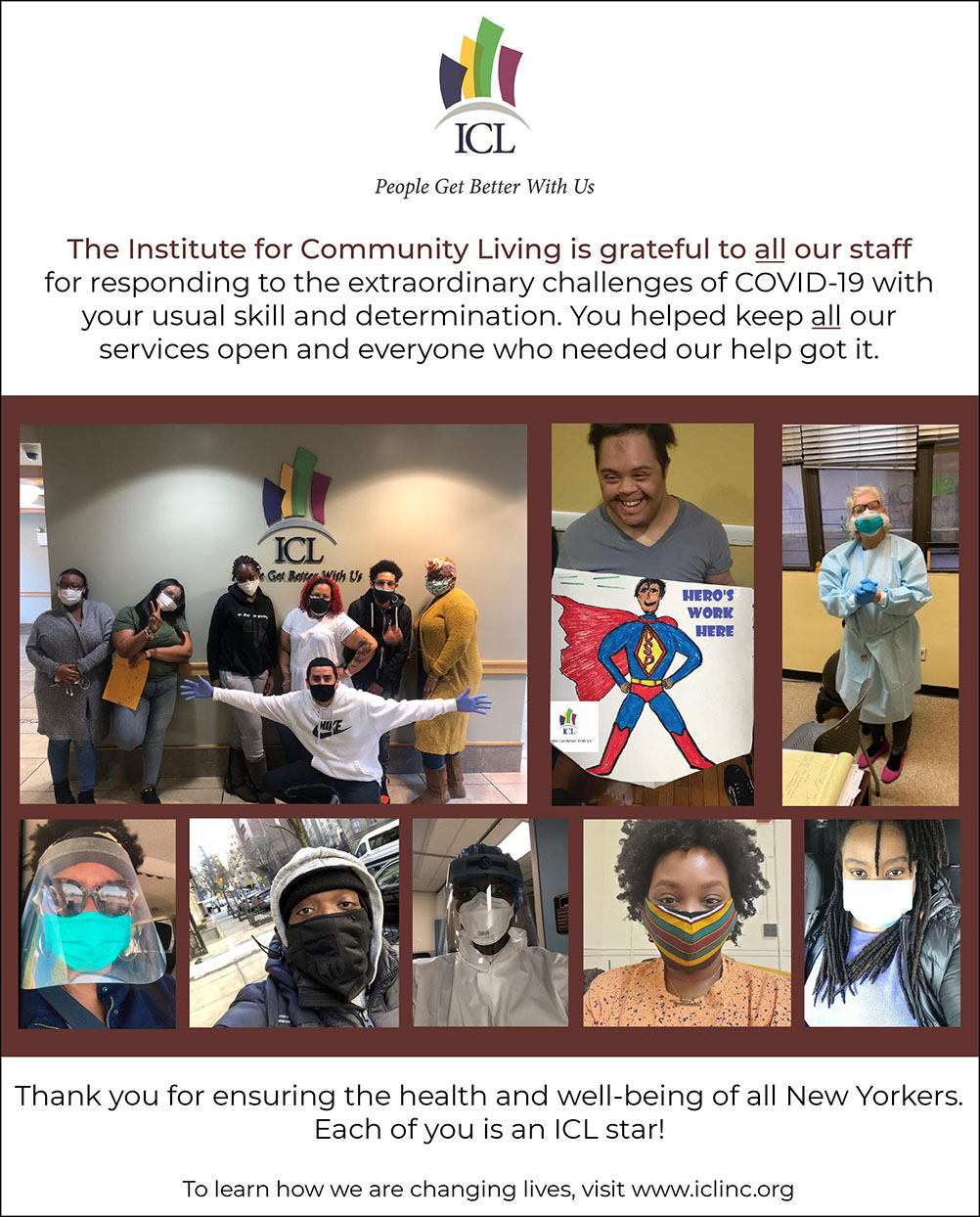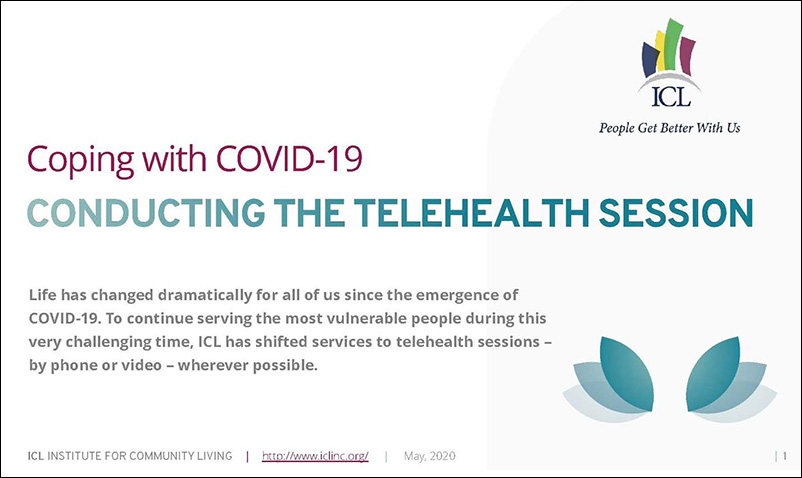During the most challenging times, even in the face of an unprecedented crisis — The Institute for Community Living (ICL) seeks to implement strengths-based approaches to helping people cope and eventually to thrive once again. This holds true whether a person is living with a childhood trauma, substance abuse, suicidal thoughts or the most daunting circumstances such as those brought by the COVID-19 pandemic.

Mindy Liss

David Kamnitzer, LCSW-R
Beyond the great physical toll the past few months have taken, the ravages of COVID-19 have had significant effect on the mental health of communities throughout America. That of course came as no surprise. Millions of people lost a family member or loved one and were prevented from saying goodbye. Those who survived the virus experienced frightening symptoms they will not easily forget. Unemployment reached levels most of us have never seen in our lifetime; workers in whole sectors of our economy now face uncertain futures. Wall-to-wall news coverage of the pandemic is triggering for trauma survivors.
And the number one instruction for dealing with the virus meant physically isolating ourselves, robbing us of one of our best coping mechanisms, the company of others. This forced many to face these enormous challenges alone. For those living with mental illness and substance issues, like most of the 10,000 people ICL helps each year, though isolation was already their everyday experience, following stay-in-place orders further stigmatized them.
Last month, the Centers for Disease Control and Prevention released a study done in June that revealed that 40% of American adults were struggling with mental health or substance use issues. This included 25.5 % who reported symptoms of anxiety disorder (compared to 8.1 % in the same period in 2019) and 24.3 % with depressive disorders compared with 6.5 % the prior year. The study further showed that 13 % of those surveyed began or increased substance use and 11 % seriously considered suicide. The latter number was especially shocking and challenged mental health systems already limited and pulled in many directions because of COVID-19.
As we reflect on the mental health challenges faced in the past six months and the likely growing mental health crisis on the horizon, there has never been a more important time to shed light on how we are responding, particular to mitigate the rise in suicide and suicidal ideations. In the best of times, this is a topic too painful to discuss because more than any other area of mental health, suicide remains a highly stigmatized and taboo topic. Though it could be more easily overlooked during a worldwide health crisis, as health care providers, we know the subject has to be confronted head on. And the fact that September is designated as National Suicide Awareness Prevention month provides more impetus and information to help us confront this difficult topic. Given the increase in suicides and suicidal ideation during the pandemic means we must not only openly discuss this subject but we have to make information readily available and advocate for reforms that will save lives. Most of all, it is our responsibility to let people know that it is okay to talk about this subject, in fact it is essential.
Given the increase in suicides and suicidal ideation during the pandemic means we must not only openly discuss this subject but we have to make information readily available and advocate for reforms that will save lives. Most of all, it is our responsibility to let people know that it is okay to talk about this subject, in fact it is essential.
At ICL, we serve 10,000 New Yorkers each year in more than 100 programs across the five boroughs. The people we see each and every day are living with mental illness and substance use disorders; many are families in crisis. While no one is immune from the emotional dimensions of the pandemic, the populations we work with have been particularly vulnerable to a tremendous exacerbation of their mental health struggles. Bringing help and support to this population had to be done quickly but also very carefully.
At ICL, we have standing protocols widely disseminated to our staff when someone at risk for suicide comes through our doors. Agency clinicians immediately put into place risk assessment and all of our risk management protocols that start with immediate access to psychiatry services. Strength- based treatment such as dialectical behavior therapy (DBT) and cognitive behavioral therapy (CBT), offer hands-on, practical approaches to problem-solving aimed at changing patterns of thinking or behavior. We also put a safety plan in place to be able to respond quickly if something goes wrong and continue to assess the risk to the client until they are out of danger.
ICL is also benefiting from the work being advanced by the Zero Suicide for Healthcare organization including evidence-based practices for screening, assessment, direct treatment and collaborative safety planning.
In some respects, the pandemic afforded us new opportunities to make services more accessible to those at highest risk, including those showing suicidal ideations. At the onset of the pandemic, our agency went into high gear to reach out to the community and make services as accessible as possible. Since getting the most at-risk to access help is difficult to begin with, we instituted rapid admissions processes for clinic and treatment services for those at highest risk.
With the reality of people being forced to stay home, we shifted most services to a telehealth model. This proved to be a very effective shift, particularly for those living with the more serious mental health conditions and particularly those at greatest risk for suicide. We had a vehicle that could offer immediate help.
We knew that clients prone to depression and living alone, might become increasingly paranoid when forced to quarantine in their apartments. This also caused deep concern about a spike in substance use and an exacerbation of psychiatric symptoms, even to the point of showing suicidal ideations or to suicide. Knowing which clients might be easily triggered during this period allowed us to make a concerted effort to ensure that regular wellness checks through home visits continue. ICL staff are often a person’s only human connection so doing these visits continued for those most isolated; always with full adherence to safety precautions and use of personal protective equipment.
The upside of our experience in addressing the impact of COVID was the realization of just how useful telehealth could be, especially for people with multiple health problems. In fact, compliance with appointments increased significantly: From March to May, the percentage of ICL clients who failed to keep medical appointments dropped from 33% to 15%. Using telehealth has also allowed us to triage health issues in our residences so clients did not have to travel to appointments that required accompaniment by two staff, resulting in a reduction in costly emergency room visits that also frees up medical personnel to meet the demands of COVID patients.
Shifting overnight to telehealth was our clear imperative but also extremely challenging. Our IT department spent the first weekend preparing 600 new laptops for clinicians to conduct remote services. And doing treatment remotely necessitated special staff training including how to deal with issues putting clients in any danger, such as a sign of suicidal thoughts or ideations. An ICL clinical team produced a manual (see below) with tips and strategies for staff to have at their fingertips and ideas for self-care, to support the “helpers” living with the new realities of COVID.
It was not only staff who found telehealth very useful; clients felt very positively about these services. The proof is in the numbers. ICL conducted a survey since the pandemic began, of almost 1,500 clients that showed high satisfaction with telehealth. Many of them even prefer it to visiting a clinic and 80% said they want to continue remote appointments after the pandemic.
Of course, remote services are not the solution for all clients; in fact, for many attending an ICL program (at a physical location) is a lifeline. A good example is our PROS program which offers comprehensive, outpatient treatment and support to people living with serious mental illness. A number of PROS clients came to our East New York Health Hub during the pandemic. The program was closed but the Hub where it is located, was open for them to visit if they needed the familiarity and some clients in the program’s intensive art program continued to work with the art therapist on projects they’d started before COVID. For these individuals, art helps build a tremendous source of confidence and stability that they themselves say is life-saving. In addition to having the chance to socialize and engage in activities, PROS often offers the only hot meal for people so staff made sure whoever needed it were fed. They also ensured clients were connected to longer-term solutions like food assistance programs and to benefits like unemployment insurance.
It is not only our staff and partner health care providers helping save lives during this crisis. ICL clients themselves are remarkably resilient. Long before COVID, clients worked on skills and tools through behavioral therapy and learning about healthy living. All of this work that’s gone on since they got involved at an ICL program meant they were better able to manage their heightened emotions during the pandemic, helping to keep incidents low over the past few months.
The underlying goal of everything we do at ICL is to assure people they have a future and that our dedicate staff are with them every step of the journey. No matter what problem they may face or how troubled they may feel, we never give up on anyone.
David Kamnitzer LCSW-R, is Chief Clinical Officer and Mindy Liss is VP for Strategic Communications at the Institute for Community Living (ICL).






